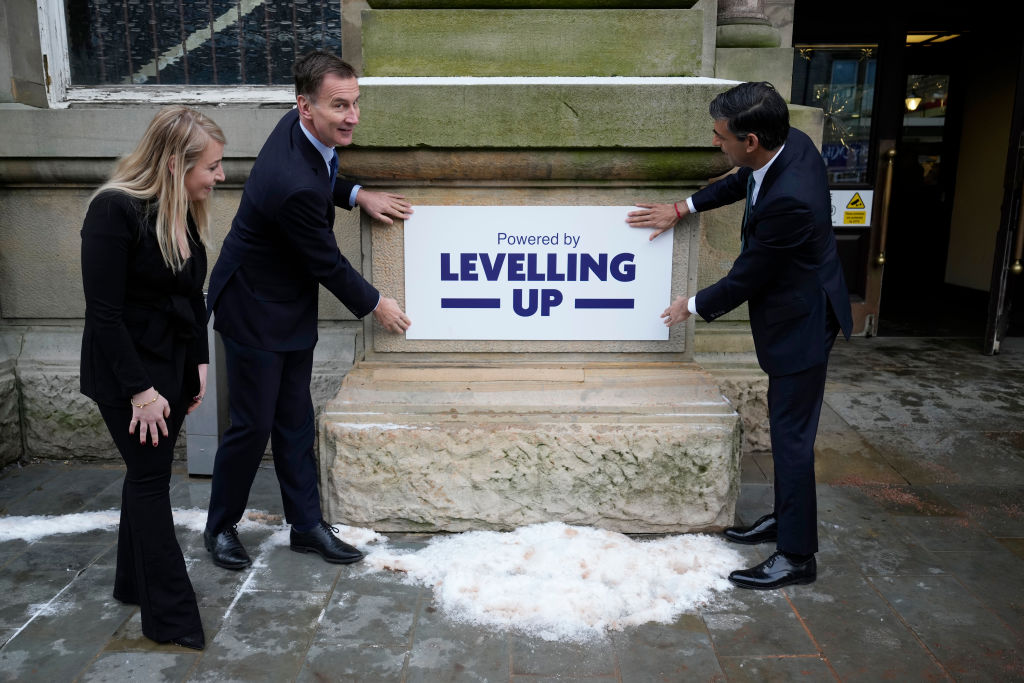This morning, the new Labour government quietly tippexed any trace of “levelling up” from Whitehall. Jim McMahon, now minister for the newly named Housing, Communities and Local Government department, suggested he never wants to hear the phrase uttered again. Housing Secretary Angela Rayner announced the change by attacking the Conservative Party’s “gimmicks and slogans”. But what can be read from the defenestration of a political slogan? Forget cake and scandal: behind those two words — levelling up — lies the real ruin of the Conservative Party and, indeed, Westminster as a whole.
Anyone familiar with SW1 knows the never-ending churn of its policy recommendations, slogans and strategies from a labyrinth of think tanks and political communications agencies. It drones through the decaying reaches of the British state like a bluebottle that can’t be swatted. In “levelling up”, was an idea — powerpoint-friendly and suitably devoid of reality — that could feasibly hold together a new political realignment. It was intended to paper over the hardened fissures of industrial decline and provide Boris Johnson with a tool of financial patronage for his Northern allies.
The estimated price tag alone might have spoken to the fantasy, with £30 billion being the most modest estimate. Of course, it was another way of dressing up a perennial British disease that reached back into the dark recesses of the country’s industrial past. “Solving regional inequality” is something every British government since the Seventies has had to pretend to care about.
But as many have discovered in the past, it’s an expensive and intractable problem. The genius of levelling up as a marketing ploy was that it implied quick wins, minimal sacrifice and little politics. Who needs to speak to the electorate about the disproportionate tax burden, the difficulties of propping up British industry and the trade-offs involved in a globalised economy when you can talk about skills hubs, faster train journeys and rejuvenated town centres? Fiscally and aesthetically, it was a touching-up job, quietly working its way around any serious questions of state renewing policy lest it reawaken any political ghosts from the last century.
In the end, as with most of the Conservative government’s policies over the last parliament, it became more a beating stick than a baton. Covid-19 and inflation ended up crippling many of the construction projects. HS2 was dropped. For Labour it was a political opportunity to refocus on the impact of austerity in those areas. For Red Wall MPs, it became an increasingly hard sell. In Doncaster, Nick Fletcher MP found it strange that a culture hub was built, but not a hospital. By 2022, more money was making its way to the hotels housing asylum seekers than being allocated for the latest levelling-up fund.
This is not to say that Labour will not also fall foul of its own political messaging. Caution, prudence and highlighting the scale of the task has been the party’s communications strategy so far — so much so that it’s starting to look like its ministers are getting their excuses in early. But soon Labour’s manifesto commitments and policy rumours may start to rub against these words and play out their own little tribute act to the hollow grandiosity of levelling up.
Labour’s National Wealth Fund, set aside to turbocharge green energy and gigafactories, has been described as “paltry” and underfunded to the tune of tens of billions. Meanwhile, it wants to deepen and broaden devolution to the same mismanaged councils it will soon have to bail out from financial ruin. It is overseeing an energy policy that is likely to drive up energy prices and undermine the transformative industrial strategy it wants to talk up.
From the Left, it has been attacked for a lack of economic ambition and for continuing the consensus its critics are now calling “Starnakism”. Like its predecessors, Labour may find that though there is some comfort and short-term political capital in a political slogan, there is much ruin too.











Join the discussion
Join like minded readers that support our journalism by becoming a paid subscriber
To join the discussion in the comments, become a paid subscriber.
Join like minded readers that support our journalism, read unlimited articles and enjoy other subscriber-only benefits.
Subscribe